ONE-MEMBER WARDS A STRENGTH, NOT A WEAKNESS.
[To THE EDITOR OF THE "SPECTATOR." I
SIR,—I am surprised at the opposition that has been presented to the proposed division made by the Government Seats Bill of large towns and cities into single-Member constituencies. The grounds of this disapproval seem to me to proceed from un- founded apprehensions, rather than from a rational attempt to realise the precise state of things the Reform Bill will bring into existence. It is said by many who have the reputation for sagacity and statesmanship, that this part of the Government plan will disintegrate the solidarity of the political life of our large boroughs. No very strong defence of the measure has yet appeared,—perhaps for the simple reason that neither of the two or three greatest names still left us in politics have given much space to the subject in the remarks they have so far made in public ; and perhaps because the general tone of the English mind is historic rather than speculative. Sir Charles Mike's speech at Aylesbury was very interesting, but beyond his ex- pressed opinion it contains little that even his warmest admirers could claim to bear the marks of any great prescience. The country has been struggling through the wilderness, fighting the battle of Reform, sometimes checked, sometimes victorious,
but ever hoping for the goodly land lying before them. Now that we are nearing the goal of our efforts, we look for some lawgiver to ascend the Mount of Vision and tell us what he sees of that new kingdom this measure will set up- No such utterance has yet reached us. Dry officialism has presented its statistics, but for constructive imagination and prophecy we have yet to wait. Perhaps we may have to wait a long time for the appearance of those qualities in English states- manship. Meanwhile, we .hear loudly enough the clamours of disappointed crocheteers, of Peer-haters, and of dull short- sightedness that cannot see how specialisation can co-exist with unity,—a fact all nature is constantly preaching to us. I have little doubt that Lord Salisbury suggested the cutting- up of the large boroughs into sections to break the force of the Caucus, and to increase the chances of Tory candidates and the apostles of Fair-trade, which should be called False- trade. I imagine his lordship will find that weapon recoil upon himself, and that before two more elections have taken place it will be confessed that he has been " hoist with his own petard.' The single-Member constituencies in large boroughs will deepen the unity of the democracy, instead of loosening its cohesion. The existing system is a far severer test of the unity of the Liberal Party, from causes which all who have had experience of its working will appreciate. What has always on the eve of any contested election been the difficulty in the Liberal ranks but the tension set up by the demands of the Radical Left
wing, and the Whig Right Under the new system, the division of boroughs will give fuller satisfaction to the expres- sion of Radical, and Liberal, and Whig opinion, and the com- pactness and momentum of the whole party may still be preserved. The division of a town like Birmingham into seven wards by no means disturbs the caucus system essentially; it only modifies its action. The central body ought still to be maintained, re- presenting the sifted and selected judgment of all the wards, and empowered still, as before, to select the seven candidates, and construct the general plan of the campaign. In each of the newly-constituted wards there should be subordinate and larger councils, with their various sub-associations, increasing in the number of their members as they approach the general mass. So the Liberal Party in Birmingham will have the same solidarity, and a differentiated energy not possessed before. At a general election, this plan will enable all the united forces of Liberalism to fight shoulder to shoulder, only instead of fighting for three Members, the whole town will fight for the triumph of Liberalism in every division, and for the return of seven Liberal Members. On that plan, and with good leadership, Lord R. Churchill's return for any seat in the Midland capital will be- impossible. The counties, in some cases, might be worked on a similar plan, somewhat altered. The old organisation should be maintained, and modified. Unity in variety should be the•
guiding principle.—I am, Sir, &c., J. M.


































 Previous page
Previous page